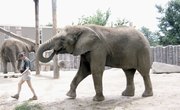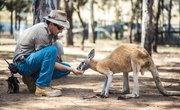Working with animals provides some people with a great sense of personal fulfillment. Several careers involving animals require an education to degree level. The animal-lover has a wide choice of bachelor's degrees associated with animals, depending on his interests. For those with a primary interest in theoretical information about animals, a bachelor's degree in zoology fits the bill. Bachelor's degrees in veterinary science are suited to those interested in animal health, and bachelor's degrees in animal science, animal behavior and animal husbandry are good choices for those interested in the practical aspects of working with animals.
Bachelor's Degree in Animal Science
Animal science encompasses the disciplines concerned with domestic animals and livestock as well as those areas of food science covering food of animal origin. The animal science degree covers areas such as biology, genetics, physiology, nutrition, management of livestock, meat processing, quality control, marketing of animal-based food products such as dairy products and poultry, food science, agriculture, computer technology and management. The program covers all aspects needed to have a successful career working with animals.
Bachelor's Degree in Animal Behavior and Ethology
Animal behavior and ethology is the science governing the behavior of animals and the factors that contribute to or cause the behavior. The discipline focuses on the psychology, neurology and interactions of animals. Areas of study include animal psychology, evolution, behavioral neuroscience, perception, cognition, ethology, motivational factors, learning, instinct, hormonal factors, interactions within and outside of the species and several other disciplines that govern animal behavior. This degree prepares students for graduate level studies or further education in animal health concentrations or for a career in life sciences.
Bachelor's Degree in Veterinary Science
Veterinary science encompasses those disciplines related to the health of animals. It covers medical, diagnostic and therapeutic sciences as applied to animals. Areas of study include animal husbandry, veterinary biology and histology, nutrition, animal behavior, principles of disease, animal reproduction, pathophysiology, animal clinical studies, veterinary professional practice and business management. A degree in veterinary science is a good way to prepare for veterinary school. Another four years of study is required after the bachelor's degree to become a veterinarian.
Bachelor's Degree in Zoology
Zoology is the study of animal behavior, environment and ecology, biology, genetics, evolution, classification and conservation. Bachelor's degrees in zoology usually require study and research in animal biology and entail both classroom instruction and laboratory work. Some areas of specialization for a zoology degree include animal behavior, animal biology, neurosciences, evolutionary biology, ecology and embryonic development. A bachelor's degree in zoology prepares students for graduate research and careers in diverse fields such as teaching, veterinary science, government, environmental programs, forensics and industrial manufacturing plus many other fields and industries connected with the life sciences.
Related Articles
References
Resources
Writer Bio
Gissimee Doe has been writing for over 11 years on a range of subjects and interests. Her favorite genres are horror, science fiction, adventure and food. Doe maintains a number of fashion and style blogs and is currently working on her first novel. She holds a Bachelor of Science in computer science and a Master of Science in computer-based management information systems.











